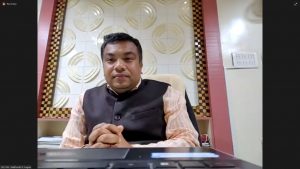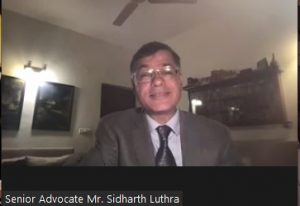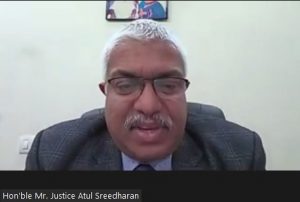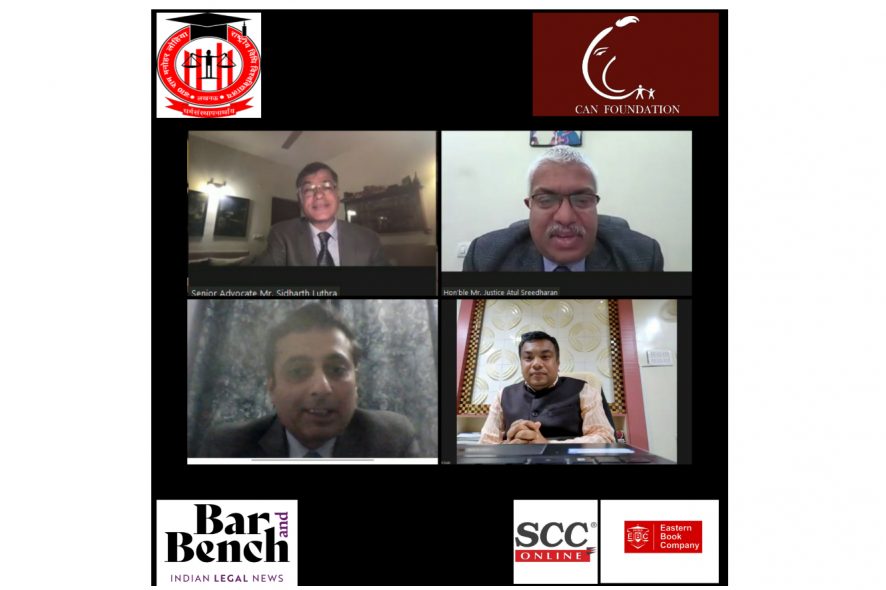The Confederation of Alumni for National Law Universities (CAN Foundation) & Dr. Ram Manohar Lohia National Law University, Lucknow (RMLNLU) hosted a webinar on “Bail & Jail: The Rule & The Exception”. The Panelists were HMJ Siddharth Mridul, Judge, Delhi High Court; HMJ Atul Sreedharan, Judge, Madhya Pradesh High Court, Mr. Siddharth Luthra, Senior Advocate, Supreme Court of India and Prof. (Dr.) S.K. Bhatnagar, Vice-Chancellor, RMLNLU. The webinar was moderated by Mr. Amit Anand Tiwari, AOR, Supreme Court of India and Ms. Vidhi Thaker, Law Clerk and Research Assistant, Supreme Court of India.

CEO of CAN Foundation Siddharth Gupta greeted and paid reverence to all the speakers. He released the Chandragupta Magazine 2020 which enlists the contributions and accomplishments of CAN Foundation in the previous year.

Mr. Siddharth Luthra, while addressing question of conditions of Bail, posed certain essential questions, “What is the effect of such restrictive conditions? What does a person do to seek Bail at a stage where he / she is under investigation?”. He also pointed practical implications. He illustrated his stance by stating that the jails were being crowded with undertrial prisoners which was against the Constitutional Mandate. He further questioned the test of seriousness of the other offences which differed from the IPC offences. He concluded by questioning the applicability and rationality of these reverse burden work which were devised to the benefit of the society. He emphasized on the immediate necessity of the Parliament to look into it, in spite of it being upheld by the Supreme Court. He remarks,
“We need to ask ourselves the question: does it really serve its purpose and reduce crimes? My answer is No and the numbers show it”.
He said that crowding of Jails is a health hazard for the accused as well as public. He recalls when he started practice, High Court used to be the last resort for Bail. A Bail matter hardly used to go to the Supreme Court. But now, He says 1/8 of his practice in the Supreme Court is Anticipatory Bail.

Justice Atul Sreedharan began by stating that fundamental rule that the Bail is the Rule and Jail is the Exception. He commented that reality is quite opposite, with reference to Madhya Pradesh. While taking on from where Mr. Siddharth had left, where he said that his 1/8th of his Criminal Court practice is on Bail applications. Justice Sreedharan added that in Madhya Pradesh about 8/10th of Criminal Court practice would be on Bail applications.
While talking about the Vishnu Pandit Case [1] he mentioned:
“This case has raised such a ruckus, perhaps, in Delhi and there were so many discussions and deliberations on it but in Madhya Pradesh it happens on a daily basis. The Vishnu Pandit case is common and it is the rule out here. Unfortunately, there is a preponderant fear of the High Court that action would be taken if the Bail is granted.”
Speaking on Bail & Personal Liberty, he said that one of the earliest sources perhaps is the Universal Declaration of Human Rights. Article 1 reads that “All human beings are born free and equal in Dignity and Rights.” Whenever you take any action which deprives Human Liberty, there must be more than adequate reasons for doing so. Article 3 says that everyone has the Right to Life, Liberty and Security of person. Article 9, it says that no one shall be subjected to arbitrary arrest, detention or exile. Now when we look at this particular Article in the backdrop of Arnesh Kumar [2] Judgment by the Supreme Court where J. Chandramoli Prasad when he talked about the police and its reverence for liberty or rather the lack of it, and would arrest a person in the drop a hack only because a non-Bailable case has been registered. In the Arnesh Kumar judgment, it was also stated that the need for an arrest is never looked into by the Police or the arresting authority.
With context to Madhya Pradesh, Justice Sreedharan mentioned that- “We can’t entirely blame the Police because when you look at it as to why the police acts in such a way as Police is overburdened with lack of workforce.” He cited an example from Damoh, around 100 km from Jabalpur, to show the lack of effective policing. He further stated that in such conditions arrest is the easiest way of doing the job. After the arrest, the job transfers to the District Court, and further to the High Court.
He also shared some instances where criminal appeals are withdrawn by the appellant who has put in more than 14 years and says that the State is now offering him a remission on a condition of withdrawal of the Criminal Appeal. This is an indictment of our system which can obviously be cured if the 90% of those Bail applications are allowed by the District Judiciary.
Justice Sreedharan added that,
“If the State by an arbitrary act goes ahead and violates Liberty then the only option that is left with a person languishing in jail is to approach the Court. It depends on how soon can he get to the Court that would grant him Bail?
While talking about the Anticipatory Bail, he added,
“The emphasis on Personal Liberty has been reflected in the Gurbaksh Singh Sibba[3] judgment. It is legendary even today it holds relevance. We also have Siddharam Satlingappa Mhetre [4] case which reiterates what has been laid down in Gurbaksh Singh Sibba. In between these judgments, we had some judgment of the Supreme Court which said after Anticipatory Bail was granted, it cannot be the conclusion of the trial. But you had to regular Bail because at some point of time you had to surrender to the Lower Court and take regular Bail. This was set aside in the Sushila Agarwal [5] case and reiterated the principle laid down in Gurbaksh Singh Sibba case. No particular limit can be set for the purpose of Anticipatory Bail.”
In Anticipatory Bail, the foremost factor to look into is whether the arrest is essential. The arrest is essential for some reasons a) that investigation is going on and the person is required to join the investigation and custodial investigation depending upon the nature of the offence alleged and if he has the benefit of the Anticipatory Bail, he may not cooperate with the police to the extent he would otherwise when he is in custody. b) if he is not granted Anticipatory Bail would he interfere with the process of investigation, destroy evidence? c) if he is granted Anticipatory Bail would he evade the process of Justice altogether and not be available for the trail.
He concluded his speech by commenting,
“The grant of the Anticipatory Bail evolved from the Judicial Dicta and metamorphosis of this principle over the years is actually received in negative in certain States. It is more tilting towards the Anticipatory Bail rather than grant. In cases of major offences even if there is no major evidence only because the allegation is of the offence punishable of death or life imprisonment. Bail is the reason given by the Lower Court while dismissing the Anticipatory Bail.”
Amit Anand Tiwari, when asked HMJ Sreedharan to elucidate light on the the Indian Bail Jurisprudence in the roots and variance of the conditions of Bail, HMJ Sreedharan explained the extent of Bail applications that run through more than 80-90 % in the Indian Courts. Justice Sreedharan has said that some of the applications represent applicants who have been already serving long sentences. Justice Sreedharan has thereby explained the necessity about the reforms that have to be undertaken immediately. He further answered that the community service must be exercised in India, while considering all facts and circumstances. The Grant of Community service must involve applicability of Judicial mind by Justice Sreedharan granting the said service. He stated that,
“It is all good for us to say ignorance of law is no excuse but ground reality is different. There was a case of statutory rape where a girl below 18 eloped and got married. Husband was tried for rape. The girl cried asking to leave the man”.
In conclusion, Advocate Gaurav Sharma gave vote of thanks.
[1] ILR (1993) 2 Del 181.







